Financial Analysis and Budgeting for FMCG Supply Chain
VerifiedAdded on 2023/06/11
|10
|2083
|257
AI Summary
This article provides a detailed analysis of financial analysis and budgeting for FMCG supply chain. It includes a comparative analysis of Colgate and Crest toothpaste, global supply chain and value creation, procurement, role of logistics in supply chain value creation, FMCG supply chain, inventory management and operations related to sustainability of supply’s value chain, financial analysis, and strategic challenges and changes for FMCG supply chain in the future.
Contribute Materials
Your contribution can guide someone’s learning journey. Share your
documents today.

Running head: FINANCIAL ANALYSIS AND BUDGETING
Financial analysis and budgeting
Name of the Student
Name of the University
Author Note
Financial analysis and budgeting
Name of the Student
Name of the University
Author Note
Secure Best Marks with AI Grader
Need help grading? Try our AI Grader for instant feedback on your assignments.
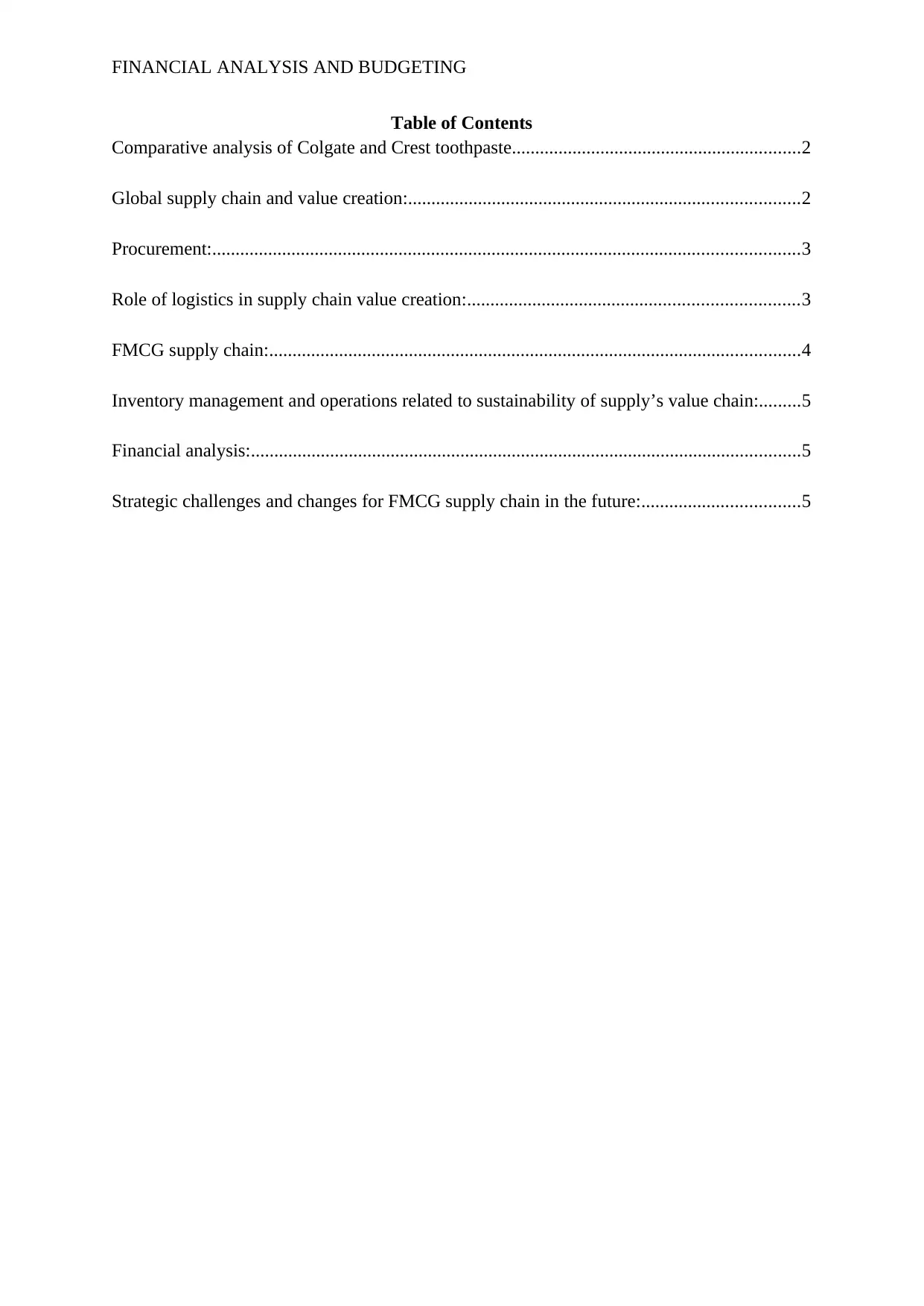
FINANCIAL ANALYSIS AND BUDGETING
Table of Contents
Comparative analysis of Colgate and Crest toothpaste..............................................................2
Global supply chain and value creation:....................................................................................2
Procurement:..............................................................................................................................3
Role of logistics in supply chain value creation:.......................................................................3
FMCG supply chain:..................................................................................................................4
Inventory management and operations related to sustainability of supply’s value chain:.........5
Financial analysis:......................................................................................................................5
Strategic challenges and changes for FMCG supply chain in the future:..................................5
Table of Contents
Comparative analysis of Colgate and Crest toothpaste..............................................................2
Global supply chain and value creation:....................................................................................2
Procurement:..............................................................................................................................3
Role of logistics in supply chain value creation:.......................................................................3
FMCG supply chain:..................................................................................................................4
Inventory management and operations related to sustainability of supply’s value chain:.........5
Financial analysis:......................................................................................................................5
Strategic challenges and changes for FMCG supply chain in the future:..................................5
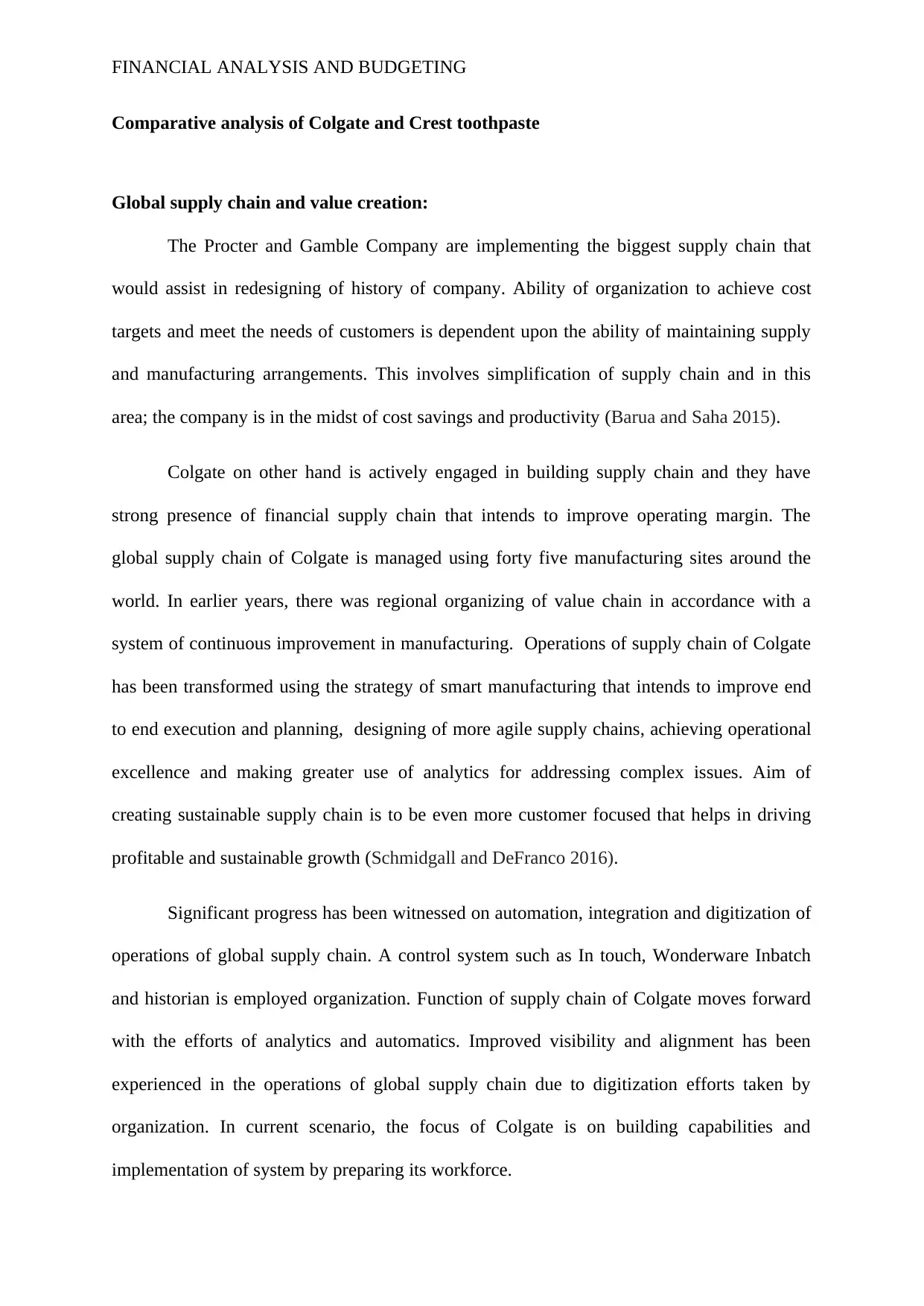
FINANCIAL ANALYSIS AND BUDGETING
Comparative analysis of Colgate and Crest toothpaste
Global supply chain and value creation:
The Procter and Gamble Company are implementing the biggest supply chain that
would assist in redesigning of history of company. Ability of organization to achieve cost
targets and meet the needs of customers is dependent upon the ability of maintaining supply
and manufacturing arrangements. This involves simplification of supply chain and in this
area; the company is in the midst of cost savings and productivity (Barua and Saha 2015).
Colgate on other hand is actively engaged in building supply chain and they have
strong presence of financial supply chain that intends to improve operating margin. The
global supply chain of Colgate is managed using forty five manufacturing sites around the
world. In earlier years, there was regional organizing of value chain in accordance with a
system of continuous improvement in manufacturing. Operations of supply chain of Colgate
has been transformed using the strategy of smart manufacturing that intends to improve end
to end execution and planning, designing of more agile supply chains, achieving operational
excellence and making greater use of analytics for addressing complex issues. Aim of
creating sustainable supply chain is to be even more customer focused that helps in driving
profitable and sustainable growth (Schmidgall and DeFranco 2016).
Significant progress has been witnessed on automation, integration and digitization of
operations of global supply chain. A control system such as In touch, Wonderware Inbatch
and historian is employed organization. Function of supply chain of Colgate moves forward
with the efforts of analytics and automatics. Improved visibility and alignment has been
experienced in the operations of global supply chain due to digitization efforts taken by
organization. In current scenario, the focus of Colgate is on building capabilities and
implementation of system by preparing its workforce.
Comparative analysis of Colgate and Crest toothpaste
Global supply chain and value creation:
The Procter and Gamble Company are implementing the biggest supply chain that
would assist in redesigning of history of company. Ability of organization to achieve cost
targets and meet the needs of customers is dependent upon the ability of maintaining supply
and manufacturing arrangements. This involves simplification of supply chain and in this
area; the company is in the midst of cost savings and productivity (Barua and Saha 2015).
Colgate on other hand is actively engaged in building supply chain and they have
strong presence of financial supply chain that intends to improve operating margin. The
global supply chain of Colgate is managed using forty five manufacturing sites around the
world. In earlier years, there was regional organizing of value chain in accordance with a
system of continuous improvement in manufacturing. Operations of supply chain of Colgate
has been transformed using the strategy of smart manufacturing that intends to improve end
to end execution and planning, designing of more agile supply chains, achieving operational
excellence and making greater use of analytics for addressing complex issues. Aim of
creating sustainable supply chain is to be even more customer focused that helps in driving
profitable and sustainable growth (Schmidgall and DeFranco 2016).
Significant progress has been witnessed on automation, integration and digitization of
operations of global supply chain. A control system such as In touch, Wonderware Inbatch
and historian is employed organization. Function of supply chain of Colgate moves forward
with the efforts of analytics and automatics. Improved visibility and alignment has been
experienced in the operations of global supply chain due to digitization efforts taken by
organization. In current scenario, the focus of Colgate is on building capabilities and
implementation of system by preparing its workforce.
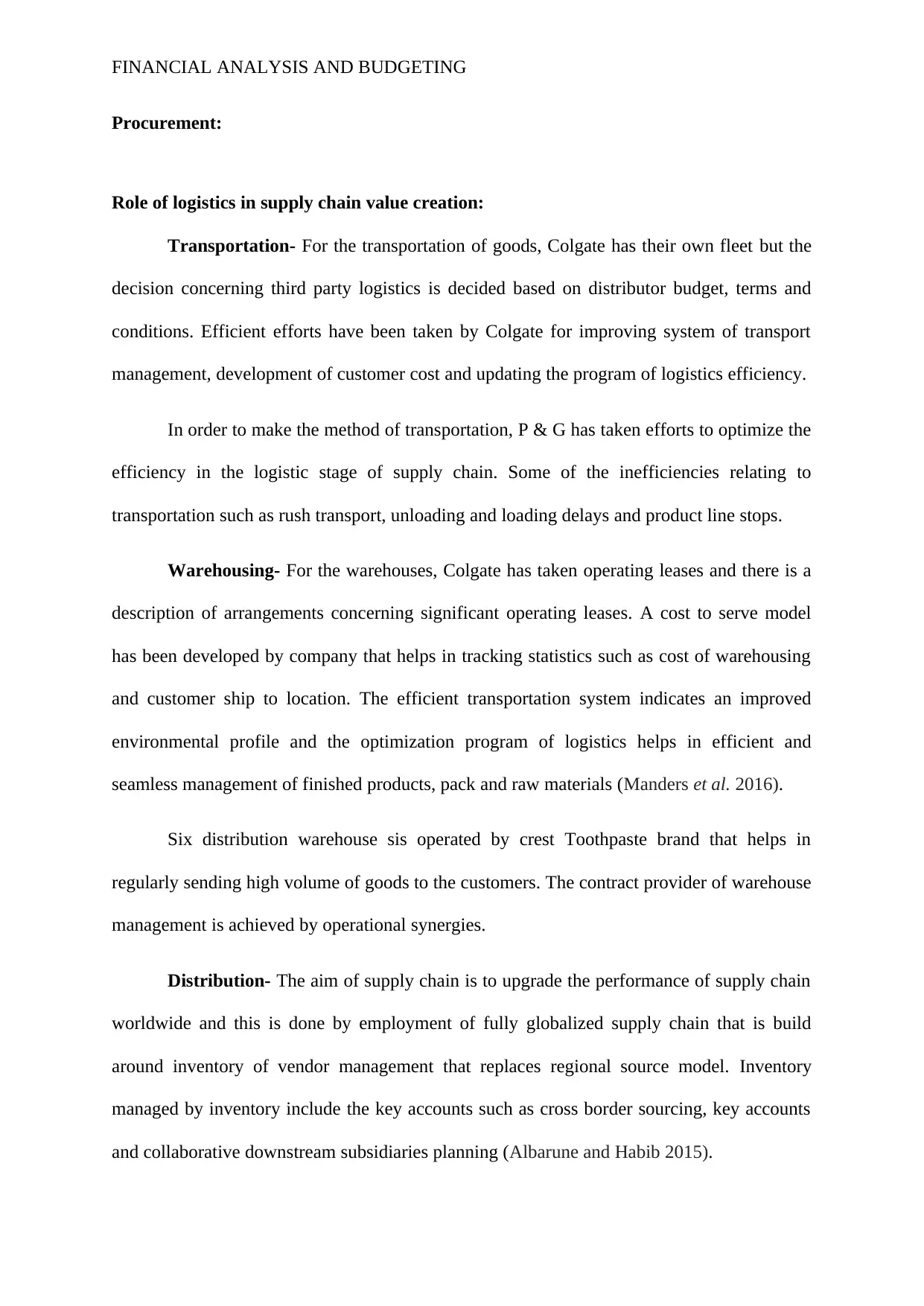
FINANCIAL ANALYSIS AND BUDGETING
Procurement:
Role of logistics in supply chain value creation:
Transportation- For the transportation of goods, Colgate has their own fleet but the
decision concerning third party logistics is decided based on distributor budget, terms and
conditions. Efficient efforts have been taken by Colgate for improving system of transport
management, development of customer cost and updating the program of logistics efficiency.
In order to make the method of transportation, P & G has taken efforts to optimize the
efficiency in the logistic stage of supply chain. Some of the inefficiencies relating to
transportation such as rush transport, unloading and loading delays and product line stops.
Warehousing- For the warehouses, Colgate has taken operating leases and there is a
description of arrangements concerning significant operating leases. A cost to serve model
has been developed by company that helps in tracking statistics such as cost of warehousing
and customer ship to location. The efficient transportation system indicates an improved
environmental profile and the optimization program of logistics helps in efficient and
seamless management of finished products, pack and raw materials (Manders et al. 2016).
Six distribution warehouse sis operated by crest Toothpaste brand that helps in
regularly sending high volume of goods to the customers. The contract provider of warehouse
management is achieved by operational synergies.
Distribution- The aim of supply chain is to upgrade the performance of supply chain
worldwide and this is done by employment of fully globalized supply chain that is build
around inventory of vendor management that replaces regional source model. Inventory
managed by inventory include the key accounts such as cross border sourcing, key accounts
and collaborative downstream subsidiaries planning (Albarune and Habib 2015).
Procurement:
Role of logistics in supply chain value creation:
Transportation- For the transportation of goods, Colgate has their own fleet but the
decision concerning third party logistics is decided based on distributor budget, terms and
conditions. Efficient efforts have been taken by Colgate for improving system of transport
management, development of customer cost and updating the program of logistics efficiency.
In order to make the method of transportation, P & G has taken efforts to optimize the
efficiency in the logistic stage of supply chain. Some of the inefficiencies relating to
transportation such as rush transport, unloading and loading delays and product line stops.
Warehousing- For the warehouses, Colgate has taken operating leases and there is a
description of arrangements concerning significant operating leases. A cost to serve model
has been developed by company that helps in tracking statistics such as cost of warehousing
and customer ship to location. The efficient transportation system indicates an improved
environmental profile and the optimization program of logistics helps in efficient and
seamless management of finished products, pack and raw materials (Manders et al. 2016).
Six distribution warehouse sis operated by crest Toothpaste brand that helps in
regularly sending high volume of goods to the customers. The contract provider of warehouse
management is achieved by operational synergies.
Distribution- The aim of supply chain is to upgrade the performance of supply chain
worldwide and this is done by employment of fully globalized supply chain that is build
around inventory of vendor management that replaces regional source model. Inventory
managed by inventory include the key accounts such as cross border sourcing, key accounts
and collaborative downstream subsidiaries planning (Albarune and Habib 2015).
Secure Best Marks with AI Grader
Need help grading? Try our AI Grader for instant feedback on your assignments.
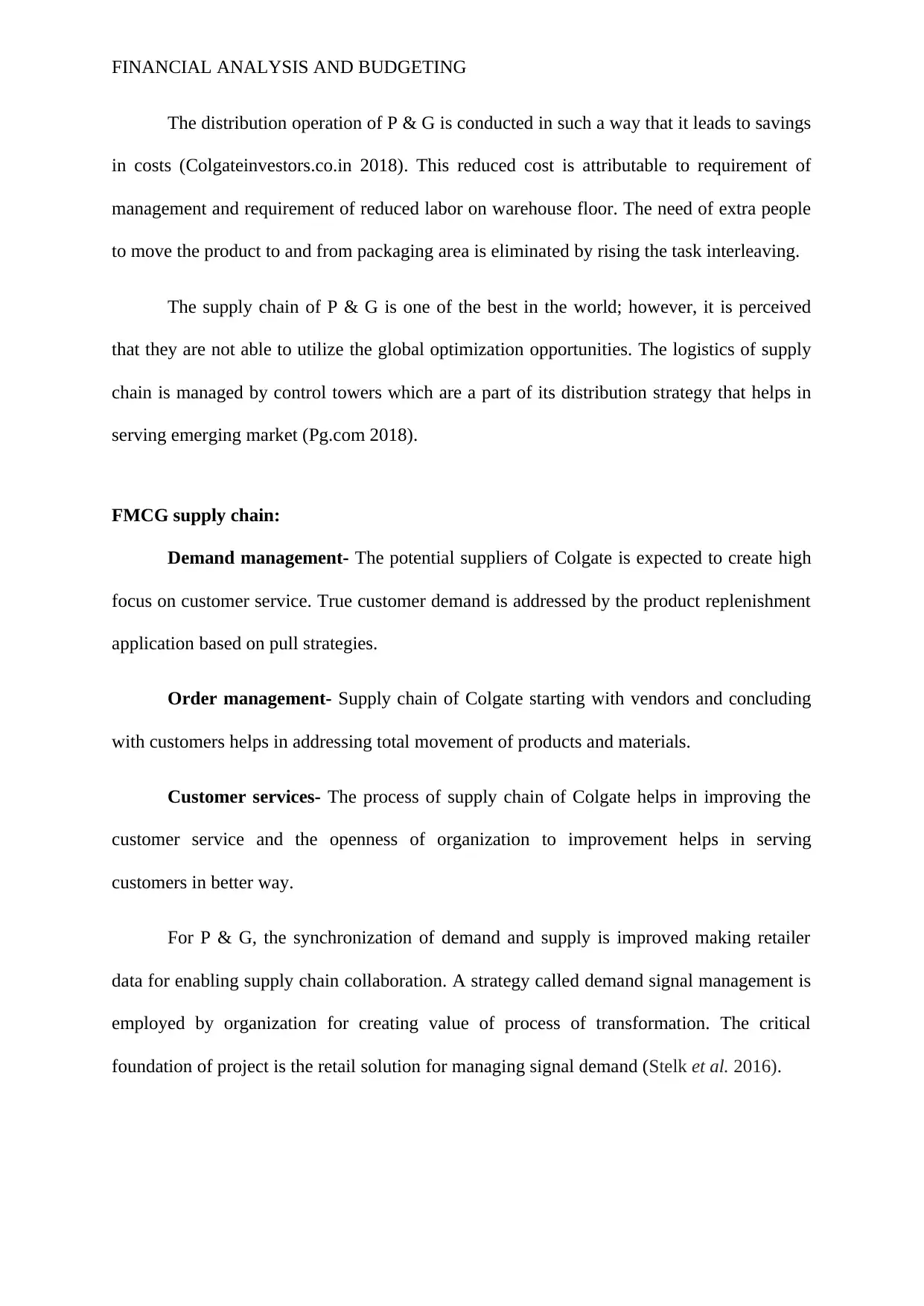
FINANCIAL ANALYSIS AND BUDGETING
The distribution operation of P & G is conducted in such a way that it leads to savings
in costs (Colgateinvestors.co.in 2018). This reduced cost is attributable to requirement of
management and requirement of reduced labor on warehouse floor. The need of extra people
to move the product to and from packaging area is eliminated by rising the task interleaving.
The supply chain of P & G is one of the best in the world; however, it is perceived
that they are not able to utilize the global optimization opportunities. The logistics of supply
chain is managed by control towers which are a part of its distribution strategy that helps in
serving emerging market (Pg.com 2018).
FMCG supply chain:
Demand management- The potential suppliers of Colgate is expected to create high
focus on customer service. True customer demand is addressed by the product replenishment
application based on pull strategies.
Order management- Supply chain of Colgate starting with vendors and concluding
with customers helps in addressing total movement of products and materials.
Customer services- The process of supply chain of Colgate helps in improving the
customer service and the openness of organization to improvement helps in serving
customers in better way.
For P & G, the synchronization of demand and supply is improved making retailer
data for enabling supply chain collaboration. A strategy called demand signal management is
employed by organization for creating value of process of transformation. The critical
foundation of project is the retail solution for managing signal demand (Stelk et al. 2016).
The distribution operation of P & G is conducted in such a way that it leads to savings
in costs (Colgateinvestors.co.in 2018). This reduced cost is attributable to requirement of
management and requirement of reduced labor on warehouse floor. The need of extra people
to move the product to and from packaging area is eliminated by rising the task interleaving.
The supply chain of P & G is one of the best in the world; however, it is perceived
that they are not able to utilize the global optimization opportunities. The logistics of supply
chain is managed by control towers which are a part of its distribution strategy that helps in
serving emerging market (Pg.com 2018).
FMCG supply chain:
Demand management- The potential suppliers of Colgate is expected to create high
focus on customer service. True customer demand is addressed by the product replenishment
application based on pull strategies.
Order management- Supply chain of Colgate starting with vendors and concluding
with customers helps in addressing total movement of products and materials.
Customer services- The process of supply chain of Colgate helps in improving the
customer service and the openness of organization to improvement helps in serving
customers in better way.
For P & G, the synchronization of demand and supply is improved making retailer
data for enabling supply chain collaboration. A strategy called demand signal management is
employed by organization for creating value of process of transformation. The critical
foundation of project is the retail solution for managing signal demand (Stelk et al. 2016).
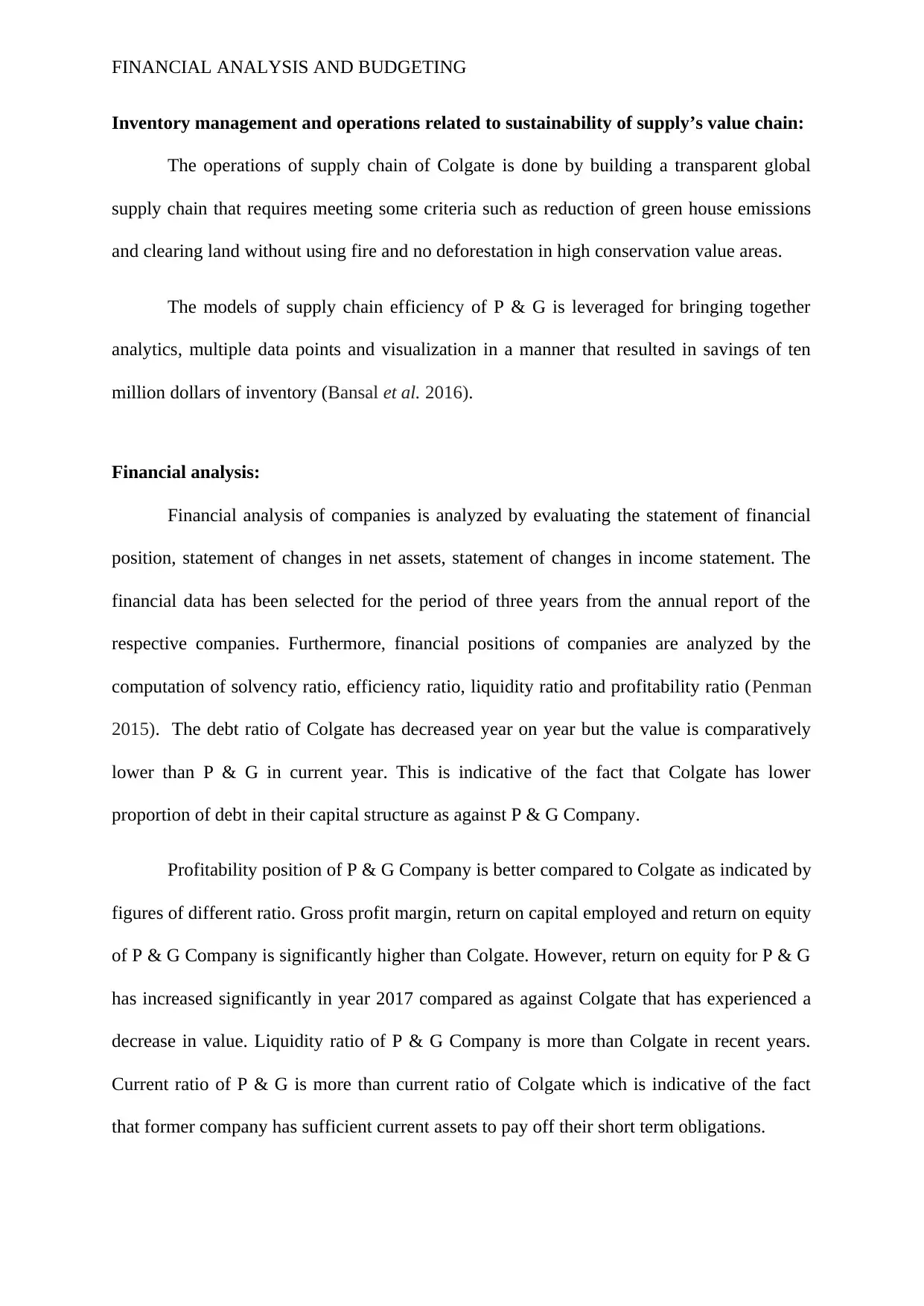
FINANCIAL ANALYSIS AND BUDGETING
Inventory management and operations related to sustainability of supply’s value chain:
The operations of supply chain of Colgate is done by building a transparent global
supply chain that requires meeting some criteria such as reduction of green house emissions
and clearing land without using fire and no deforestation in high conservation value areas.
The models of supply chain efficiency of P & G is leveraged for bringing together
analytics, multiple data points and visualization in a manner that resulted in savings of ten
million dollars of inventory (Bansal et al. 2016).
Financial analysis:
Financial analysis of companies is analyzed by evaluating the statement of financial
position, statement of changes in net assets, statement of changes in income statement. The
financial data has been selected for the period of three years from the annual report of the
respective companies. Furthermore, financial positions of companies are analyzed by the
computation of solvency ratio, efficiency ratio, liquidity ratio and profitability ratio (Penman
2015). The debt ratio of Colgate has decreased year on year but the value is comparatively
lower than P & G in current year. This is indicative of the fact that Colgate has lower
proportion of debt in their capital structure as against P & G Company.
Profitability position of P & G Company is better compared to Colgate as indicated by
figures of different ratio. Gross profit margin, return on capital employed and return on equity
of P & G Company is significantly higher than Colgate. However, return on equity for P & G
has increased significantly in year 2017 compared as against Colgate that has experienced a
decrease in value. Liquidity ratio of P & G Company is more than Colgate in recent years.
Current ratio of P & G is more than current ratio of Colgate which is indicative of the fact
that former company has sufficient current assets to pay off their short term obligations.
Inventory management and operations related to sustainability of supply’s value chain:
The operations of supply chain of Colgate is done by building a transparent global
supply chain that requires meeting some criteria such as reduction of green house emissions
and clearing land without using fire and no deforestation in high conservation value areas.
The models of supply chain efficiency of P & G is leveraged for bringing together
analytics, multiple data points and visualization in a manner that resulted in savings of ten
million dollars of inventory (Bansal et al. 2016).
Financial analysis:
Financial analysis of companies is analyzed by evaluating the statement of financial
position, statement of changes in net assets, statement of changes in income statement. The
financial data has been selected for the period of three years from the annual report of the
respective companies. Furthermore, financial positions of companies are analyzed by the
computation of solvency ratio, efficiency ratio, liquidity ratio and profitability ratio (Penman
2015). The debt ratio of Colgate has decreased year on year but the value is comparatively
lower than P & G in current year. This is indicative of the fact that Colgate has lower
proportion of debt in their capital structure as against P & G Company.
Profitability position of P & G Company is better compared to Colgate as indicated by
figures of different ratio. Gross profit margin, return on capital employed and return on equity
of P & G Company is significantly higher than Colgate. However, return on equity for P & G
has increased significantly in year 2017 compared as against Colgate that has experienced a
decrease in value. Liquidity ratio of P & G Company is more than Colgate in recent years.
Current ratio of P & G is more than current ratio of Colgate which is indicative of the fact
that former company has sufficient current assets to pay off their short term obligations.
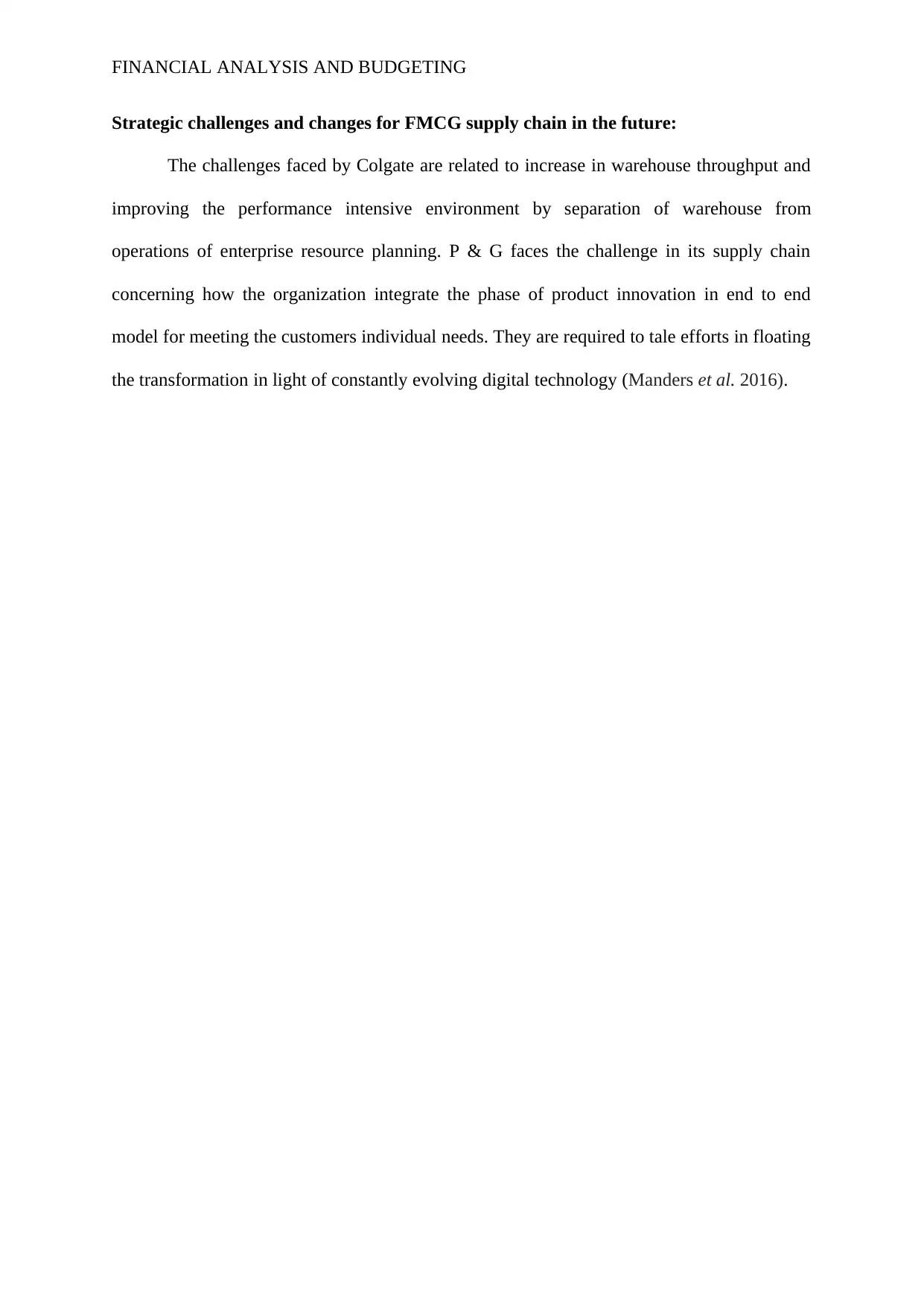
FINANCIAL ANALYSIS AND BUDGETING
Strategic challenges and changes for FMCG supply chain in the future:
The challenges faced by Colgate are related to increase in warehouse throughput and
improving the performance intensive environment by separation of warehouse from
operations of enterprise resource planning. P & G faces the challenge in its supply chain
concerning how the organization integrate the phase of product innovation in end to end
model for meeting the customers individual needs. They are required to tale efforts in floating
the transformation in light of constantly evolving digital technology (Manders et al. 2016).
Strategic challenges and changes for FMCG supply chain in the future:
The challenges faced by Colgate are related to increase in warehouse throughput and
improving the performance intensive environment by separation of warehouse from
operations of enterprise resource planning. P & G faces the challenge in its supply chain
concerning how the organization integrate the phase of product innovation in end to end
model for meeting the customers individual needs. They are required to tale efforts in floating
the transformation in light of constantly evolving digital technology (Manders et al. 2016).
Paraphrase This Document
Need a fresh take? Get an instant paraphrase of this document with our AI Paraphraser
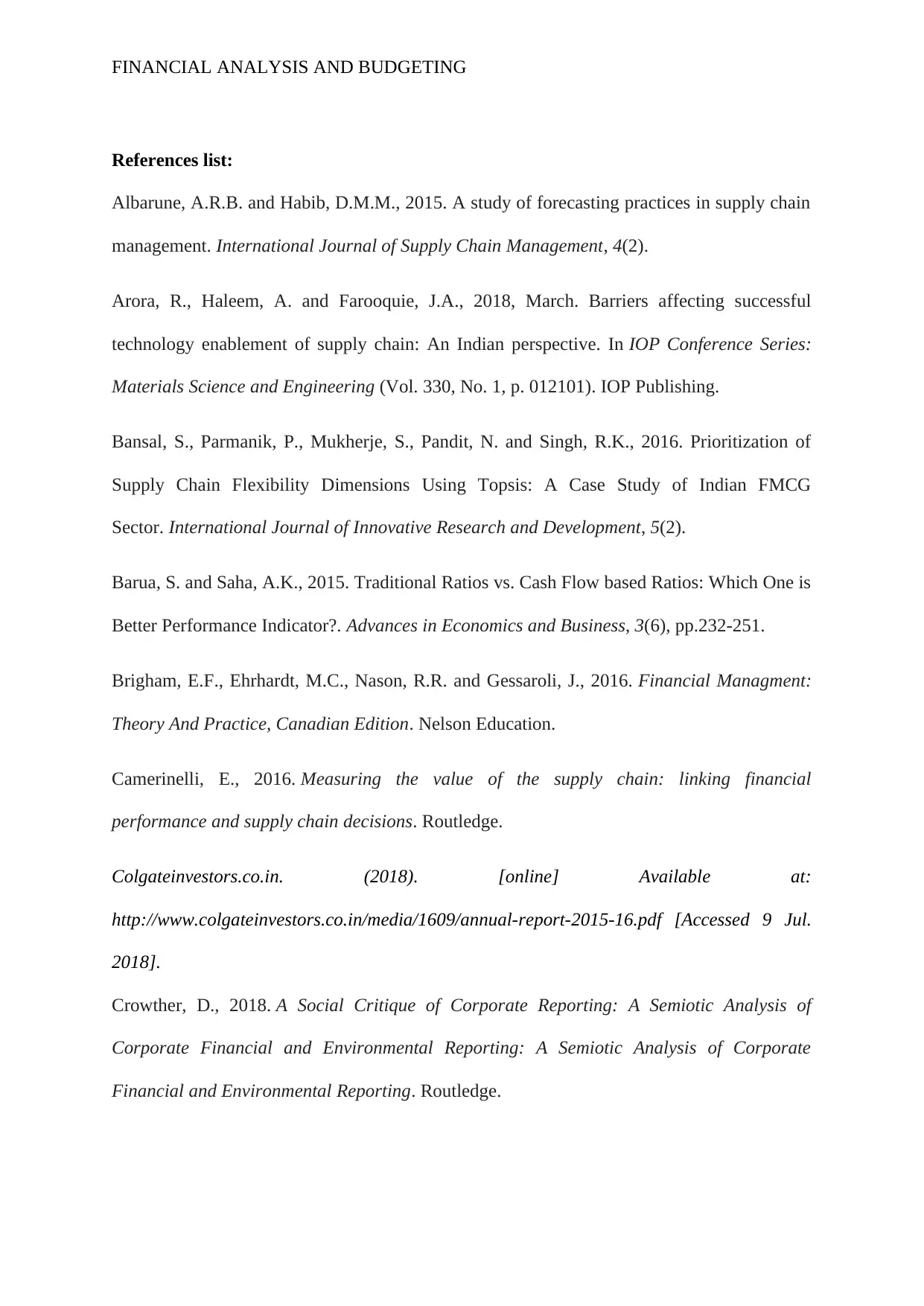
FINANCIAL ANALYSIS AND BUDGETING
References list:
Albarune, A.R.B. and Habib, D.M.M., 2015. A study of forecasting practices in supply chain
management. International Journal of Supply Chain Management, 4(2).
Arora, R., Haleem, A. and Farooquie, J.A., 2018, March. Barriers affecting successful
technology enablement of supply chain: An Indian perspective. In IOP Conference Series:
Materials Science and Engineering (Vol. 330, No. 1, p. 012101). IOP Publishing.
Bansal, S., Parmanik, P., Mukherje, S., Pandit, N. and Singh, R.K., 2016. Prioritization of
Supply Chain Flexibility Dimensions Using Topsis: A Case Study of Indian FMCG
Sector. International Journal of Innovative Research and Development, 5(2).
Barua, S. and Saha, A.K., 2015. Traditional Ratios vs. Cash Flow based Ratios: Which One is
Better Performance Indicator?. Advances in Economics and Business, 3(6), pp.232-251.
Brigham, E.F., Ehrhardt, M.C., Nason, R.R. and Gessaroli, J., 2016. Financial Managment:
Theory And Practice, Canadian Edition. Nelson Education.
Camerinelli, E., 2016. Measuring the value of the supply chain: linking financial
performance and supply chain decisions. Routledge.
Colgateinvestors.co.in. (2018). [online] Available at:
http://www.colgateinvestors.co.in/media/1609/annual-report-2015-16.pdf [Accessed 9 Jul.
2018].
Crowther, D., 2018. A Social Critique of Corporate Reporting: A Semiotic Analysis of
Corporate Financial and Environmental Reporting: A Semiotic Analysis of Corporate
Financial and Environmental Reporting. Routledge.
References list:
Albarune, A.R.B. and Habib, D.M.M., 2015. A study of forecasting practices in supply chain
management. International Journal of Supply Chain Management, 4(2).
Arora, R., Haleem, A. and Farooquie, J.A., 2018, March. Barriers affecting successful
technology enablement of supply chain: An Indian perspective. In IOP Conference Series:
Materials Science and Engineering (Vol. 330, No. 1, p. 012101). IOP Publishing.
Bansal, S., Parmanik, P., Mukherje, S., Pandit, N. and Singh, R.K., 2016. Prioritization of
Supply Chain Flexibility Dimensions Using Topsis: A Case Study of Indian FMCG
Sector. International Journal of Innovative Research and Development, 5(2).
Barua, S. and Saha, A.K., 2015. Traditional Ratios vs. Cash Flow based Ratios: Which One is
Better Performance Indicator?. Advances in Economics and Business, 3(6), pp.232-251.
Brigham, E.F., Ehrhardt, M.C., Nason, R.R. and Gessaroli, J., 2016. Financial Managment:
Theory And Practice, Canadian Edition. Nelson Education.
Camerinelli, E., 2016. Measuring the value of the supply chain: linking financial
performance and supply chain decisions. Routledge.
Colgateinvestors.co.in. (2018). [online] Available at:
http://www.colgateinvestors.co.in/media/1609/annual-report-2015-16.pdf [Accessed 9 Jul.
2018].
Crowther, D., 2018. A Social Critique of Corporate Reporting: A Semiotic Analysis of
Corporate Financial and Environmental Reporting: A Semiotic Analysis of Corporate
Financial and Environmental Reporting. Routledge.
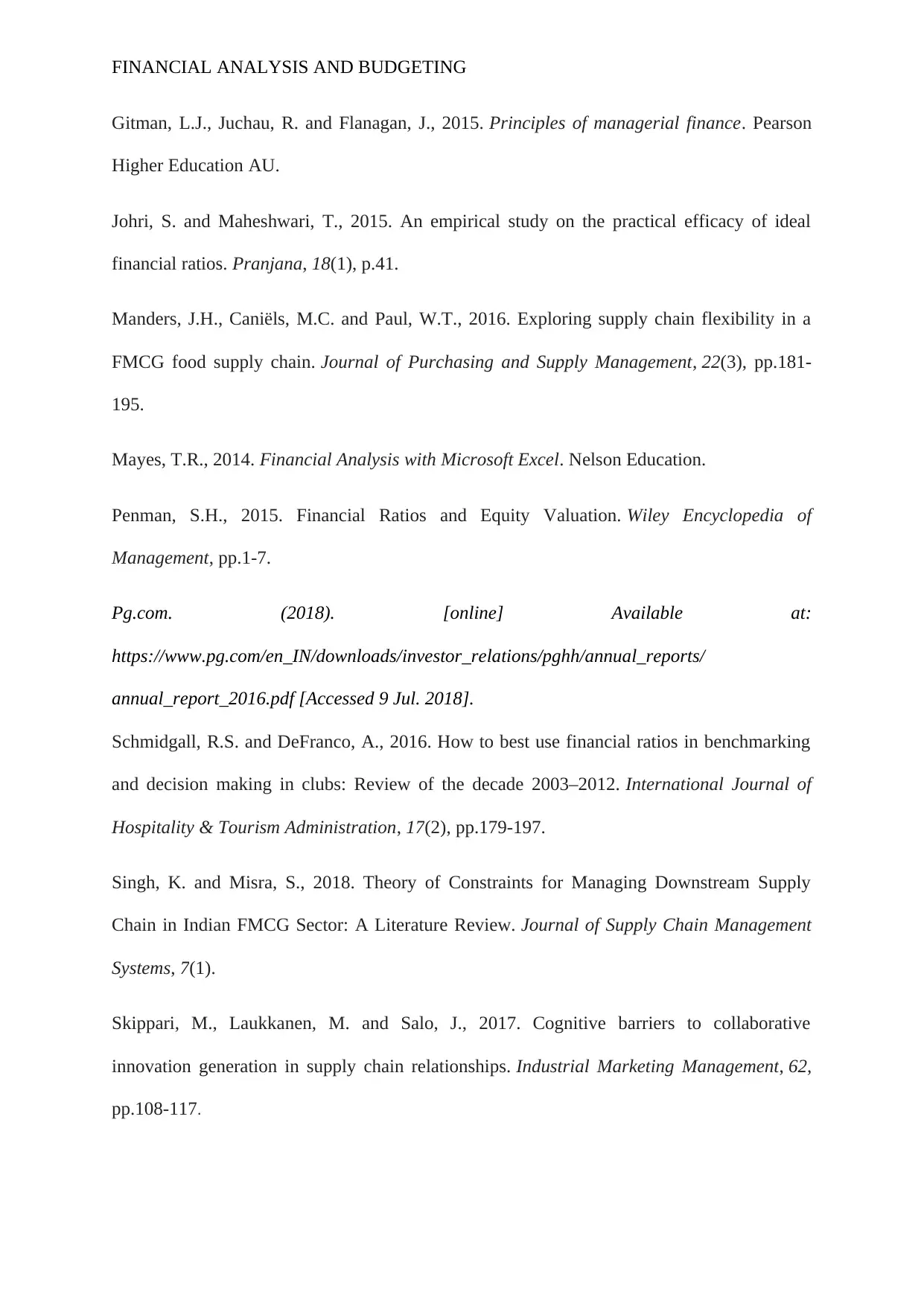
FINANCIAL ANALYSIS AND BUDGETING
Gitman, L.J., Juchau, R. and Flanagan, J., 2015. Principles of managerial finance. Pearson
Higher Education AU.
Johri, S. and Maheshwari, T., 2015. An empirical study on the practical efficacy of ideal
financial ratios. Pranjana, 18(1), p.41.
Manders, J.H., Caniëls, M.C. and Paul, W.T., 2016. Exploring supply chain flexibility in a
FMCG food supply chain. Journal of Purchasing and Supply Management, 22(3), pp.181-
195.
Mayes, T.R., 2014. Financial Analysis with Microsoft Excel. Nelson Education.
Penman, S.H., 2015. Financial Ratios and Equity Valuation. Wiley Encyclopedia of
Management, pp.1-7.
Pg.com. (2018). [online] Available at:
https://www.pg.com/en_IN/downloads/investor_relations/pghh/annual_reports/
annual_report_2016.pdf [Accessed 9 Jul. 2018].
Schmidgall, R.S. and DeFranco, A., 2016. How to best use financial ratios in benchmarking
and decision making in clubs: Review of the decade 2003–2012. International Journal of
Hospitality & Tourism Administration, 17(2), pp.179-197.
Singh, K. and Misra, S., 2018. Theory of Constraints for Managing Downstream Supply
Chain in Indian FMCG Sector: A Literature Review. Journal of Supply Chain Management
Systems, 7(1).
Skippari, M., Laukkanen, M. and Salo, J., 2017. Cognitive barriers to collaborative
innovation generation in supply chain relationships. Industrial Marketing Management, 62,
pp.108-117.
Gitman, L.J., Juchau, R. and Flanagan, J., 2015. Principles of managerial finance. Pearson
Higher Education AU.
Johri, S. and Maheshwari, T., 2015. An empirical study on the practical efficacy of ideal
financial ratios. Pranjana, 18(1), p.41.
Manders, J.H., Caniëls, M.C. and Paul, W.T., 2016. Exploring supply chain flexibility in a
FMCG food supply chain. Journal of Purchasing and Supply Management, 22(3), pp.181-
195.
Mayes, T.R., 2014. Financial Analysis with Microsoft Excel. Nelson Education.
Penman, S.H., 2015. Financial Ratios and Equity Valuation. Wiley Encyclopedia of
Management, pp.1-7.
Pg.com. (2018). [online] Available at:
https://www.pg.com/en_IN/downloads/investor_relations/pghh/annual_reports/
annual_report_2016.pdf [Accessed 9 Jul. 2018].
Schmidgall, R.S. and DeFranco, A., 2016. How to best use financial ratios in benchmarking
and decision making in clubs: Review of the decade 2003–2012. International Journal of
Hospitality & Tourism Administration, 17(2), pp.179-197.
Singh, K. and Misra, S., 2018. Theory of Constraints for Managing Downstream Supply
Chain in Indian FMCG Sector: A Literature Review. Journal of Supply Chain Management
Systems, 7(1).
Skippari, M., Laukkanen, M. and Salo, J., 2017. Cognitive barriers to collaborative
innovation generation in supply chain relationships. Industrial Marketing Management, 62,
pp.108-117.
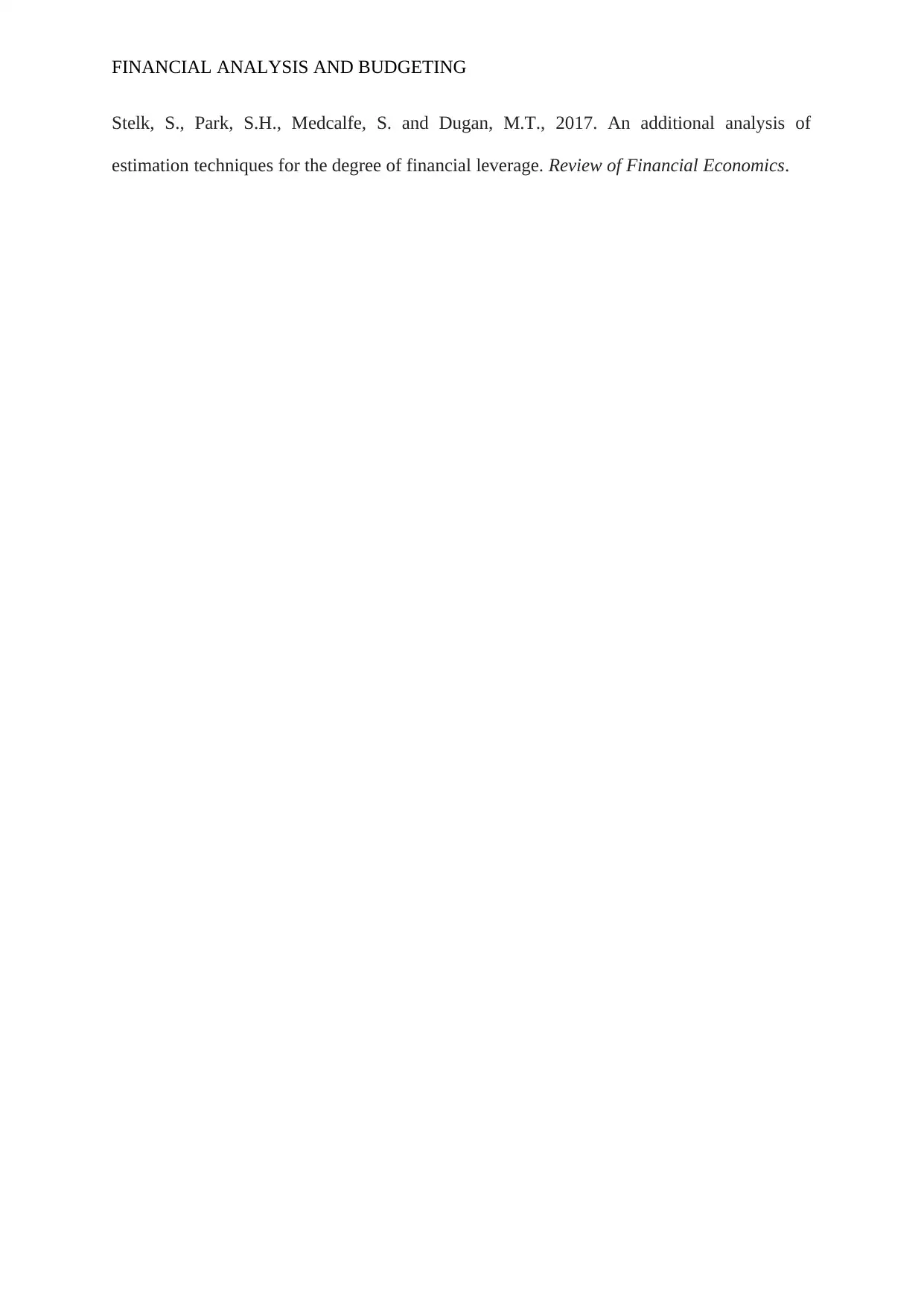
FINANCIAL ANALYSIS AND BUDGETING
Stelk, S., Park, S.H., Medcalfe, S. and Dugan, M.T., 2017. An additional analysis of
estimation techniques for the degree of financial leverage. Review of Financial Economics.
Stelk, S., Park, S.H., Medcalfe, S. and Dugan, M.T., 2017. An additional analysis of
estimation techniques for the degree of financial leverage. Review of Financial Economics.
1 out of 10
Related Documents
Your All-in-One AI-Powered Toolkit for Academic Success.
+13062052269
info@desklib.com
Available 24*7 on WhatsApp / Email
![[object Object]](/_next/static/media/star-bottom.7253800d.svg)
Unlock your academic potential
© 2024 | Zucol Services PVT LTD | All rights reserved.




